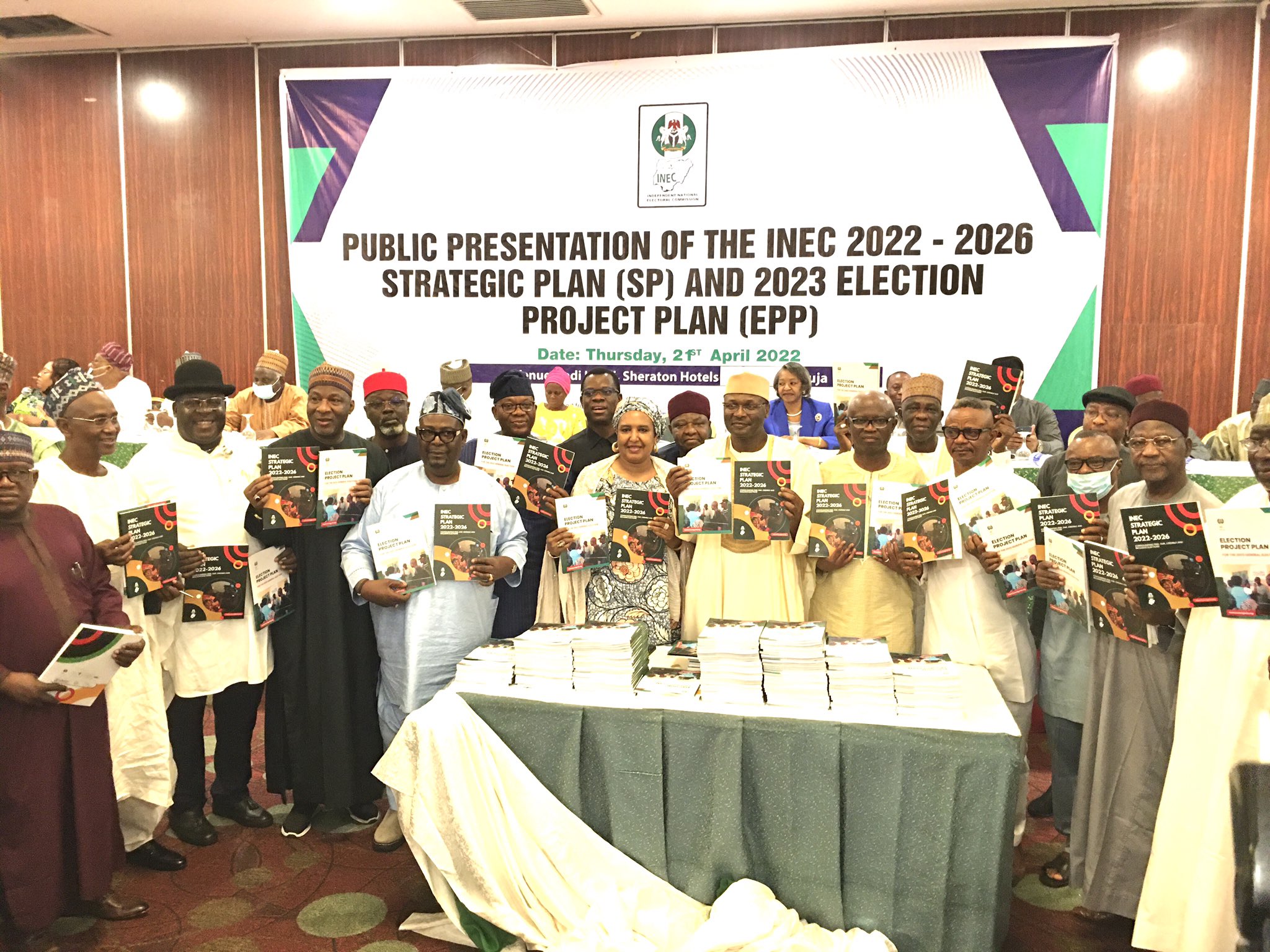Featured
FG Earns N28.02trn From Crude, VAT, Others, NEITI Confirms

A Fiscal Allocation and Statutory Disbursement (FASD) report published by the Nigeria Extractive Industries Transparency Initiative (NEITI), covering 2017-2019 has revealed that four Federal Government agencies generated N28.02trillion within the period under review.
From the figure, minerals revenue contributed N12.84trillion (56.61percent) while non-minerals revenue contributed N6.57trillion (28.97percent).
Value-added tax (VAT) accounted for N3.27trillion (14.42percent), while ¦ 19.01trillion mineral revenue was disbursed to the tiers of government.
The report also highlighted that states’ over-dependent on Federation Account has peaked, as it currently accounts for 71percent of their earnings.
The report also noted that 81percent of states allocations is spent on recurrent expenditure.
The N28.02trillion was generated by the Nigerian National Petroleum Corporation (NNPC); Federal Inland Revenue Services (FIRS); Department of Petroleum Resources (DPR) now Nigeria Upstream Petroleum Regulatory Commission (NUPRC) and the Ministry of Mines and Steel Development (MMSD).
Out of the amount, N22.68trillion was remitted to the Federation Account.
The cost of collection and Joint-venture cash calls deductions by revenue generating agencies accounted for the differences between revenue generated and remittance.
The NEITI’s FASD audit examined total extractive industry revenue remitted into the Federation Account, tracked allocation and disbursement from the account to statutory recipients as well as utilization and application of the funds by the beneficiaries between the years 2017-2019.
It also covered nine selected states: Akwa-Ibom; Bayelsa; Delta; Gombe; Imo; Kano; Nasarawa; Ondo and Rivers states.
On the nine selected states covered by the exercise, the report revealed that their combined revenues inflows within the three years period were N5.104trillion.
Breakdown showed that statutory allocation accounted for N3.55trillion, while internally generated revenue (IGR) and loans accounted for N1.33trillion and N227billion, respectively.
Further breakdown shows that Delta State recorded the highest revenue of N1.083trillion while Nasarawa State recorded the lowest revenue of N214billion.
The beneficiary agencies include: Niger Delta Development Commission (NDDC); Tertiary Education Trust Fund (TETFund); Petroleum Trust Development Fund (PTDF); Petroleum Equalization Funds (PEF); Ecological Fund (EF) and Stabilization Fund (SFs).
Others are: Nigerian Sovereign Investment Authority (NSIA); Development of Natural Resources Fund (DNRF); Excess Crude Account (ECA); Nigeria Content Development and Monitoring Board (NCDMB) and Petroleum Products Pricing Regulatory Agency (PPPRA).
The NEITI FASD report revealed that FIRS generated ¦ 13.48trillion within the period under review with Petroleum Profit Tax (PPT) accounting for N5.80trillion (43.09percent), while Value-Added Tax (VAT) and other taxes accounted for 32percent and 24percent, respectively. The service recorded highest revenue collection of N5.02trillion in 2018.
The report disclosed that a total sum of ¦ 8.82trillion was generated by NNPC within the period. Breakdown shows that ¦ 4.55trillion came from domestic crude sales, while export receipts accounted for ¦ 4.27trillion.
It further disclosed that ¦ 5.33trillion was deducted at source for JV cash call and others, leaving the net amount of N3.49trillion as transferred to Federation Account.
“During the period under consideration, a total of ¦ 8.82trillion was generated. However, only ¦ 3.49trillion (39.5percent) was remitted to the Federation Account due to deductions at source by NNPC for JV cash calls. The Deductions at source by NNPC negate the principle of Federation Account”, NEITI’s report stated.
From the report, DPR (now NUPRC) generated ¦ 3.53trillion for the three years under review, with royalty payments accounting for N3.40trillion (96.41percent).
The agency, however, transferred ¦ 3.53trillion to the Federation Account.
The audit established that the surplus of ¦ 6.72billion was as a result of unremitted receipts from prior year.
Ministry of Mines and Steel Development (MMSD) generated ¦ 12.498billion within the three years period.
Breakdown show that Mining Inspectorate Department (MID) contributed N6.43billion while Mining Cadastral Office (MCO) accounted for N6.06billion.
From the total revenue generated by the Ministry, a sum of ¦ 7.56billion was shared to the three tiers of government in 2019.
On the NDDC, NEITI report revealed that ¦ 755.96billion was generated by the commission within the period under consideration.
Breakdown shows that N551.08billion (73percent) was contributed by oil and gas companies, while the balance of ¦ 203.90billion (27percent) was the Federal Government’s contribution to the commission.
The report further revealed that the total expenditure by the commission during the period under review was N882.3billion.
Analysis of the expenditure shows that N778.29billion (88.20percent) was expended on development projects, while operational cost accounted for N104.07billion (11.80percent) of the total.
Analysis of project execution in member states ranks Delta State highest in terms of development projects undertaken by the commission to member states with total expenditure of ¦ 40.46billion (26percent) of the actual expenditure within the period, while Edo received the lowest development projects of about 5percent.
NEITI audit established that there was a gap between actual development projects expenditure as per audited financial statements and project monitoring list provided by the commission in the sum of ¦ 522.60billion.
“While N679billion was reported in NDDC’s financial statement, the project monitoring list reported expenditure of N157billion on physical projects among the nine member states”, NEITI audit report revealed.
The report, however, disclosed that 40 oil and gas companies defaulted in their payment obligation to the commission.
It also disclosed that the commission did not receive any monies from the Ecological Fund as stipulated by the law throughout the three years under review, this obviously negatively affected revenue inflow into the commission within the period.
On the Tertiary Education Trust Fund (TETFund), NEITI reported that the fund realised N644.19billion within the three years under review.
The NEITI report established that the actual funds available for disbursement by TETFund in the three years period was ¦ 624.32billion.
The report also disclosed that the sum of ¦ 102.14billion (46.55percent) was disbursed to the universities, while ¦ 46.12billion (21.35percent), ¦ 49.97billion (21.97percent) and ¦ 27.09billion (10.12percent) were disbursed to Polytechnics, Colleges of Education and other tertiary institutions programmes, respectively.
NEITI noted that the process of accessing the fund is cumbersome, and called on TETFund to simplify the process to enable more universities access the funds.
Petroleum Technology Development Fund (PTDF) revenue for the period under review was put at ¦ 155.34billion and 95percent came from signature bonus paid by oil and gas companies which is the main revenue source to the agency.
NEITI report reveals that out of ¦ 86.34billion utilised by the agency within the period under review, ¦ 59.84billion was spent on core operating expenses while ¦ 26.35billion and ¦ 143million was for personnel/administrative expenses and capital, respectively.
The report noted that the PTDF extended funding to 125 approved institutions, 43 locals and 82 foreign institutions.
According to the NEITI report there was low expenditure compared with the revenue released during the years under review as only 56percent of revenue was utilised.
The NEITI report put total receipts by Nigeria Content Development and Monitoring Board (NCDMB) for the three years under review at ¦ 126.73billion.
It noted that one percent Nigerian Content Development (NCD) payment accounted for N116.95billion (92percent) of the revenue.
The Federal Government stopped funding the agency from its budget in 2017.
According to the report, 48.07percent of the revenue was used for operating expenses while 51percent was used for capital expenditure.
The Nigerian Sovereign Investment Authority (NSIA), NEITI report disclosed that the total financial flows for the three year period were ¦ 1.33trillion.
Breakdown shows that the sum of ¦ 76.28billion was contributed by the government to the funds in 2017, while the sum of $250million was approved by National Economic Council (NEC) in 2019 but the money was remitted to the authority in August, 2020.
The report also revealed that NSIA’s investment fund witnessed phenomenal increase of 71percent within the three years under review to the sum of ¦ 946.36billion and noted that the return on capital employed for the Stabilization Fund (SF), Future Generations Fund (FGF) and Nigeria Infrastructural Fund (NIF) were 8.68percent, 7.21percent and 5.40percent, respectively.
NEITI report disclosed that Petroleum Product Pricing Regulatory Authority (PPPRA) received a total of N27.68billion as Federal Government subvention for the three years period.
It noted that the regime of subsidy payment on petroleum product was discontinued within the period under review.
The Ecological Fund (EF) recorded a total sum of ¦ 170.15billion during the period under review with statutory allocation accounting for the 93.43percent of the total revenues.
NEITI report reveals that North-Central received the highest projects in the sum of ¦ 36.08billion, while South-South received the lowest projects delivered amounting to N10.93billion.
The report also revealed that National Emergency Management Agency (NEMA) received ¦ 34.04billion from the fund.
From the report, total receipts accrued to the Stabilization Fund (SF) during the period under review were ¦ 85.10billion.
Breakdown shows that Statutory Allocation contributed 93.44percent, while other receipts accounted for 6.56percent.
NEITI reports disclosed that significant proportion of the fund during the period under review went into budget augmentation which was mainly disbursed to the states, noting that the 25percent transfers to NSIA fulfil the Fund’s statutory requirement to be set aside for investment purpose.
The report further noted that N17.4billion was transferred from the Fund in 2019 to African Union (AU) as Nigeria’s share of contribution to the body.
This transfer accounted for 19.74percent of the total disbursement from thefFund during the period under review.
The report also noted that expenses related to Federation Account Allocation Committee (FAAC) meetings and professional fees accounted for 8percent of the total fund outflows.
On Development of Natural Resources Fund (DNRF), the report revealed that the fund’s total receipts within the period under review were N284.92billion.
It noted 93.77percent of it came from statutory allocation.
The total disbursement from the fund was N312.01billion.
Disbursements to Federal Ministry of Water Resources and capital projects accounted for 44percent and 16percent, respectively.
Furthermore, the sum of N34.08billion was transferred to NEMA in 2019 which represented 11percent of total disbursement of the fund.
NEITI report revealed that not all receipts to the fund were utilised for the purpose for which the fund was established.
Featured
FG To Seize Retirees’ Property Over Unpaid Housing Loans

The Federal Government Staff Housing Loans Board says it has begun the compilation of list of retired civil servants who have defaulted on the full repayment of housing loans obtained.
Head of Information and Public Relations, FGSHLB, Mrs Ngozi Obiechina, disclosed this in a statement in Abuja, yesterday.
Obiechina quoted the Executive Secretary of the Board, Mrs Salamatu Ahmed, as saying that the move was aimed at recovering mortgaged properties from retirees who failed to meet their loan obligations.
Ahmed noted that the decision followed a recent memo issued by Mrs Patience Oyekunle, Permanent Secretary, Career Management Office, Office of the Head of the Civil Service of the Federation.
According to her, the memo reminded public servants of the mandatory requirement to obtain a Certificate of Non-Indebtedness to the FGSHLB and MDA Staff Multipurpose Cooperative Society as a precondition for retirement.
The Executive Secretary said that the board would take necessary legal steps to repossess properties where applicable, in line with the terms of the loan agreements.
She said this was in line with the provisions of the Public Service Rules 021002 (p), issued by the Office of the Head of the Civil Service of the Federation.
“I am directed to bring to your attention the provision of Public Service Rule (PSR) 021002 (p), which mandates all public servants to obtain a Certificate of Non-Indebtedness as a prerequisite for retirement.
“The Federal Government will commence the seizure of mortgaged properties belonging to retiring federal public servants who have failed to fully repay housing loans obtained from the board,” she said.
Ahmed explained that the FGSHLB reserves the legal right to repossess any mortgaged property in cases where a public servant exits service without fully repaying the loan.
She reiterated that the directive also applied to already retired officers who were still indebted.
She urged all affected public servants to regularise their loan status and obtain the required clearance certificate without delay.
“The board is currently compiling a list of such retirees, which will be forwarded to relevant regulatory agencies for debt recovery.
“The FGSHLB remains committed to enforcing compliance and ensuring proper loan recovery procedures are followed, “ she added.
Featured
FG Begins Induction For New Permanent Secretaries, Accountant-General

The Federal Government has kicked off a three-day induction programme for newly appointed Permanent Secretaries and the Accountant-General of the Federation, aimed at equipping them for strategic leadership and effective policy implementation.
The induction, according to a statement yesterday by the Director, Information and Public Relations, Federal Ministry of Information and National Orientation, Eno Olotu, which commenced on Wednesday, is being held at the National Counter Terrorism Centre in Abuja.
Speaking at the opening session, the Head of the Civil Service of the Federation, Mrs. Didi Esther Walson-Jack, congratulated the new appointees and described their roles as pivotal to governance and national development.
“Permanent Secretaries are the engine room of the government. They are critical to driving policy implementation, institutional performance, and reform across the service”, she said.
The Federal Government has kicked off a three-day induction programme for newly appointed Permanent Secretaries and the Accountant-General of the Federation, aimed at equipping them for strategic leadership and effective policy implementation.
The induction, according to a statement yesterday by the Director, Information and Public Relations, Federal Ministry of Information and National Orientation, Eno Olotu, which commenced on Wednesday, is being held at the National Counter Terrorism Centre in Abuja.
Speaking at the opening session, the Head of the Civil Service of the Federation, Mrs. Didi Esther Walson-Jack, congratulated the new appointees and described their roles as pivotal to governance and national development.
“Permanent Secretaries are the engine room of the government. They are critical to driving policy implementation, institutional performance, and reform across the service”, she said.
“The expectations are high, and the responsibility is immense. But with commitment and teamwork, we can deliver a more efficient, accountable, and citizen-centred public service.
“This final lap of FCSSIP 25 calls for urgency, accountability, and strategic focus. You must translate vision into measurable results,” she stated.
In her welcome address, the Permanent Secretary, Career Management Office, Mrs. Fatima Sugra Tabi’a Mahmood, described the programme as a strategic investment in leadership capacity and institutional effectiveness.
The sessions featured expert-led discussions, simulations, and strategic briefings facilitated by a distinguished faculty, including Engr. Suleiman Adamu, former Minister of Water Resources; Dr. Hadiza Bala Usman, Special Adviser to the President on Policy and Coordination; Mrs. Beatrice Jedy-Agba, Solicitor-General of the Federation and Permanent Secretary, Federal Ministry of Justice; Alh. Yusuf Addy, retired Federal Director; Alhaji Bukar Goni Aji, former Head of the Civil Service of the Federation; Amb. Mustapha Lawal Suleiman, Mr. Adesola Olusade, and Dr. Ifeoma Anagbogu, all retired Permanent Secretaries.
Participants include Dr. Obi Emeka Vitalis, Mrs. Fatima Sugra Tabi’a Mahmood, Mr. Danjuma Mohammed Sanusi, Mr. Olusanya Olubunmi, Dr. Keshinro Maryam Ismaila, Dr. Akujobi Chinyere Ijeoma, Dr. Umobong Emanso Okop, Dr. Isokpunwu Christopher Osaruwanmwen, Mrs. Oyekunle N. Patience, Dr. Kalba U. Danjuma, Mr. Nadungu Gagare, Mr. Onwusoro I. Maduka, Dr. Usman Salihu Aminu, Mr. Ogbodo Chinasa Nnam, Mr. Ndiomu Ebiogeh Philip, Dr. Anuma N. Ogbonnaya, Mr. Adeladan Rafiu Olaninre, and Mr. Mukhtar Yawale Muhammed, alongside the Accountant-General of the Federation, Mr. Shamseldeen Babatunde Ogunjimi.
The induction programme will feature sessions on public sector leadership, policy delivery, ethics in service, digital transformation, and performance management.
Featured
NNPCL To Undergo Forensic Audit Soon -FG

The Minister of Finance and Coordinating Minister of the Economy, Wale Edun, has announced that a forensic audit of the Nigerian National Petroleum Company Limited (NNPCL) will begin soon.
Edun revealed this at the ongoing Nigerian Investor Forum, held alongside the IMF/World Bank Spring Meetings in Washington DC.
The minister explained that the recent changes in the NNPCL management are part of a broader effort by the Federal Government to clean up and examine the company closely.
While addressing top global investors, including representatives from J.P. Morgan, Edun shared key reforms the government has introduced to revive the economy and restore investor confidence.
He told the investors that the government’s bold economic steps have laid a strong foundation to attract private investment.
He stated, “Our goal is not just to maintain this momentum, but to accelerate it. We are targeting seven per cent annual growth, and we believe the policies we have implemented have laid the groundwork to achieve this.”
Edun highlighted that President Bola Tinubu’s administration has rolled out major reforms that are already making a difference.
He added that the Nigerian economy grew by 3.84 per cent in the fourth quarter of 2024 and recorded a 3.4 per cent growth for the year.
Edun further stressed the importance of the reforms, describing them as “unprecedented,” adding that, “We said we would do it, and now we have done it. This time, we’re staying the course.”
He pointed out signs of progress such as lower budget deficits, a better trade balance, and a more stable exchange rate.
He also said that the focus is now on growing key sectors, especially agriculture.
According to Edun, agriculture is at the top of the government’s agenda, with the aim of improving food supply and increasing productivity.
“We aim to close the food supply gap, not by importing more, but by enabling domestic producers to scale and innovate,” he said.
On infrastructure, Edun revealed that the government has rolled out 90,000km of fibre optic cable to improve internet access.
He said this move is crucial for supporting young Nigerians and tech startups.
He also noted that 4,000km of roads have been offered for private sector participation, with the first 1,000km already approved for construction.





